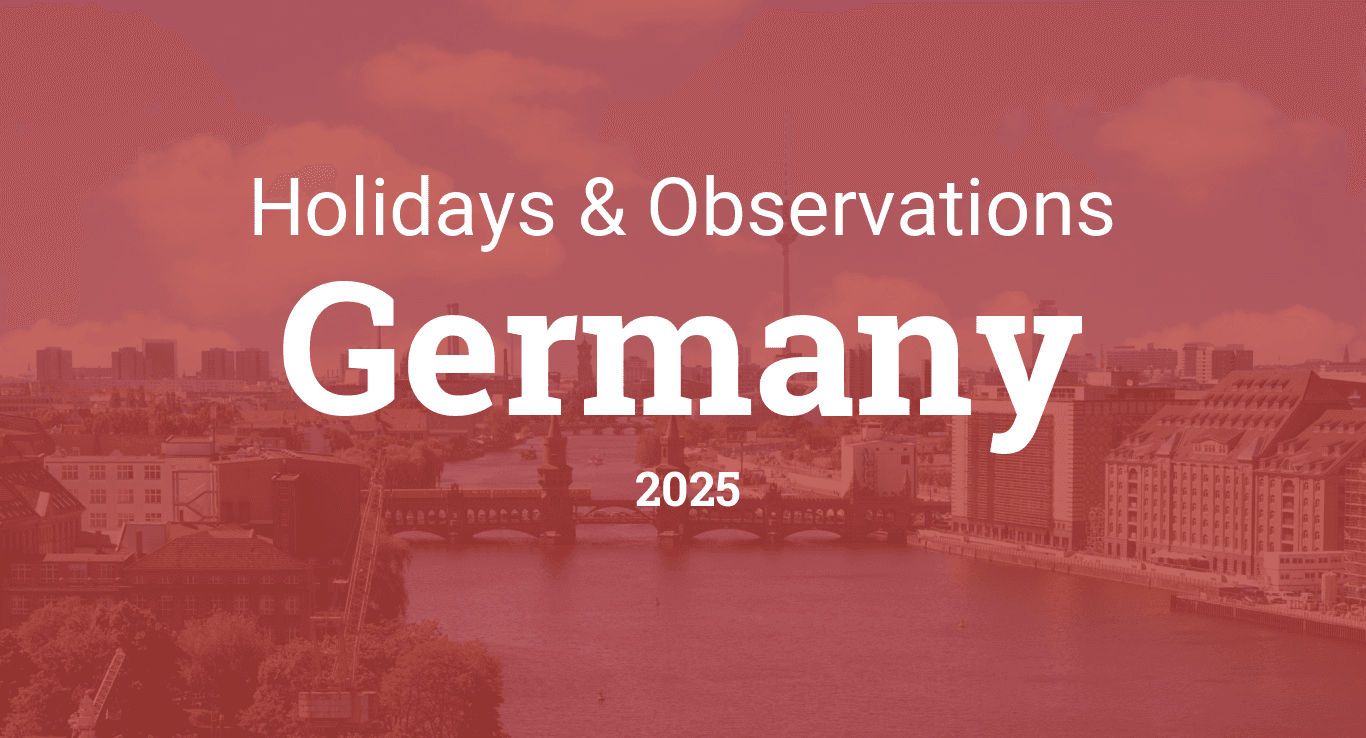Germany is known for its rich culture, history, and traditions, many of which are reflected in the country’s public holidays. These holidays not only celebrate historical events and religious observances but also offer an opportunity for people to take a break, spend time with family, and participate in various cultural festivities. In 2025, Germany will observe several public holidays, some of which are nationwide, while others are celebrated only in specific states.
This comprehensive guide will walk you through the key public holidays in Germany for 2025, explain their significance, and highlight the unique traditions associated with each holiday. We will also look at the differences in public holidays across Germany’s federal states, as not all holidays are observed uniformly across the country.
Overview of Public Holidays in Germany
Public holidays in Germany are regulated by the individual states (Länder), so while there are several holidays observed nationwide, some holidays are specific to certain regions. Germany’s public holidays can be divided into two main categories:
- National Public Holidays: These are celebrated across all German states.
- Regional Public Holidays: These holidays are observed only in specific states, based on local customs, religious significance, or historical relevance.
Understanding which holidays are national versus regional is crucial, as it determines whether businesses and schools will be closed and if public transportation schedules will be affected.
National Public Holidays in Germany 2025
The following table outlines the national public holidays in Germany for 2025, which will be observed across all federal states:
| Holiday | Date | Day of the Week | Holiday Type |
|---|---|---|---|
| New Year’s Day (Neujahrstag) | January 1, 2025 | Wednesday | National |
| Good Friday (Karfreitag) | April 18, 2025 | Friday | National (Christian) |
| Easter Monday (Ostermontag) | April 21, 2025 | Monday | National (Christian) |
| Labour Day (Tag der Arbeit) | May 1, 2025 | Thursday | National |
| Ascension Day (Christi Himmelfahrt) | May 29, 2025 | Thursday | National (Christian) |
| Whit Monday (Pfingstmontag) | June 9, 2025 | Monday | National (Christian) |
| German Unity Day (Tag der Deutschen Einheit) | October 3, 2025 | Friday | National |
| Christmas Day (Erster Weihnachtstag) | December 25, 2025 | Thursday | National (Christian) |
| Boxing Day (Zweiter Weihnachtstag) | December 26, 2025 | Friday | National (Christian) |
These holidays are celebrated across the country, and most businesses, schools, and public offices will be closed. Let’s explore each of these national holidays in detail.
Detailed Breakdown of National Public Holidays
A. New Year’s Day (Neujahrstag) – January 1, 2025
New Year’s Day marks the beginning of the calendar year and is a public holiday throughout Germany. This day is generally spent recovering from New Year’s Eve celebrations, which are known as “Silvester.” The holiday symbolizes a fresh start, and many Germans celebrate with fireworks, family gatherings, and meals that include traditional dishes like sauerkraut and pork for good luck in the coming year.
- Traditions: Fireworks, family meals, and the custom of sending New Year’s greetings (“Neujahrswünsche”).
- Significance: It marks the beginning of a new year and is a day for rest and reflection.
B. Good Friday (Karfreitag) – April 18, 2025
Good Friday is one of the most significant Christian holidays in Germany, commemorating the crucifixion of Jesus Christ. This solemn day is a public holiday across the country, and it is typically observed with church services and quiet reflection. In some regions, dancing and public entertainment are restricted due to the somber nature of the day.
- Traditions: Church services, reflective gatherings, and bans on dancing and public festivities in some states.
- Significance: A day of mourning in Christian tradition, marking the crucifixion of Christ.
C. Easter Monday (Ostermontag) – April 21, 2025
Easter Monday is the day following Easter Sunday, celebrating the resurrection of Jesus Christ. It is a day of joy and is marked by various activities such as Easter egg hunts and family gatherings. It is also a public holiday across Germany, and many families take advantage of the long weekend to travel or spend time outdoors.
- Traditions: Easter egg hunts, family meals, and outdoor activities.
- Significance: A day of celebration for Christians, marking the resurrection of Jesus Christ.
D. Labour Day (Tag der Arbeit) – May 1, 2025
Labour Day, also known as International Workers’ Day, is a public holiday dedicated to workers’ rights and achievements. It is celebrated with parades, rallies, and political speeches across Germany. In addition to its significance as a day to honor laborers, many Germans use this holiday for leisurely activities like hiking or picnicking, as May 1 often signals the arrival of spring.
- Traditions: Parades, political rallies, and leisure activities such as hiking.
- Significance: Celebrates workers’ rights and the labor movement, a day for political activism and relaxation.
E. Ascension Day (Christi Himmelfahrt) – May 29, 2025
Ascension Day is a Christian holiday that commemorates Jesus Christ’s ascension into heaven. It falls on a Thursday and is a public holiday across Germany. Interestingly, this day is also known as Father’s Day (Vatertag) in Germany, and it is common for men to celebrate with outings or barbecues.
- Traditions: Church services, family outings, and in some regions, Father’s Day celebrations with hikes or barbecues.
- Significance: A Christian holiday marking Jesus Christ’s ascension to heaven.
F. Whit Monday (Pfingstmontag) – June 9, 2025
Whit Monday, also known as Pentecost Monday, is a Christian holiday celebrated the day after Pentecost, which marks the descent of the Holy Spirit upon the apostles. This day is observed across Germany and is often used for family gatherings and outdoor activities, especially as it occurs in late spring.
- Traditions: Family meals, outdoor activities, and attending church services.
- Significance: A Christian holiday celebrating the coming of the Holy Spirit.
G. German Unity Day (Tag der Deutschen Einheit) – October 3, 2025
German Unity Day celebrates the reunification of Germany in 1990, following the fall of the Berlin Wall. This holiday is a symbol of national pride and unity, and it is celebrated with official ceremonies, public events, and fireworks across the country. It is the only national holiday in Germany that is explicitly dedicated to the country as a whole.
- Traditions: Public events, concerts, speeches by political leaders, and fireworks.
- Significance: A day to celebrate the reunification of Germany and the values of democracy and freedom.
H. Christmas Day (Erster Weihnachtstag) – December 25, 2025
Christmas Day is one of the most important Christian holidays in Germany, celebrating the birth of Jesus Christ. Germans typically spend the day with family, attending church services and enjoying traditional meals. The day is filled with warmth, gift-giving, and religious observance.
- Traditions: Attending church, family meals, gift exchanges, and singing Christmas carols.
- Significance: A Christian holiday celebrating the birth of Christ, marked by family gatherings and religious observance.
I. Boxing Day (Zweiter Weihnachtstag) – December 26, 2025
Boxing Day, also known as the Second Day of Christmas, is a continuation of the Christmas celebrations. It is a quieter holiday often spent with extended family or visiting friends. In some regions, it is a day for charitable giving and helping those in need.
- Traditions: Visiting family and friends, charitable acts, and relaxation.
- Significance: Extends the Christmas festivities and provides an additional day for family gatherings.
Regional Public Holidays in Germany 2025
In addition to the national holidays, Germany also has several regional holidays that are celebrated only in certain states. These holidays often reflect the religious and cultural traditions of specific regions, particularly in Catholic areas of southern Germany.
Here are some key regional holidays in 2025:
| Holiday | Date | Day | States Observed |
|---|---|---|---|
| Epiphany (Heilige Drei Könige) | January 6, 2025 | Monday | Baden-Württemberg, Bavaria, Saxony-Anhalt |
| Corpus Christi (Fronleichnam) | June 19, 2025 | Thursday | Baden-Württemberg, Bavaria, Hesse, North Rhine-Westphalia |
| Assumption of Mary (Mariä Himmelfahrt) | August 15, 2025 | Friday | Bavaria (some parts), Saarland |
| Reformation Day (Reformationstag) | October 31, 2025 | Friday | Brandenburg, Mecklenburg-Vorpommern, Saxony, Saxony-Anhalt, Thuringia |
| All Saints’ Day (Allerheiligen) | November 1, 2025 | Saturday | Baden-Württemberg, Bavaria, North Rhine-Westphalia, Rhineland-Palatinate, Saarland |
Let’s take a closer look at the regional holidays and their significance
A. Epiphany (Heilige Drei Könige) – January 6, 2025
Epiphany, also known as the “Feast of the Three Kings,” is a Christian holiday celebrating the visit of the Magi (Three Wise Men) to the baby Jesus. This holiday is primarily observed in the southern states of Baden-Württemberg, Bavaria, and Saxony-Anhalt. The day is marked with church services, and in some regions, children dressed as the three kings go from door to door singing and collecting donations for charity.
- Traditions: Church services, “Sternsinger” (Star Singers) going door to door.
- Significance: Celebrates the biblical story of the Three Wise Men visiting the infant Jesus.
B. Corpus Christi (Fronleichnam) – June 19, 2025
Corpus Christi is a Catholic holiday that celebrates the Eucharist. It is observed in several Catholic regions, including Baden-Württemberg, Bavaria, and parts of Hesse and North Rhine-Westphalia. The day is marked by processions through towns and villages, where the Blessed Sacrament is carried in a monstrance, often followed by celebrations and fairs.
- Traditions: Religious processions, fairs, and family gatherings.
- Significance: Celebrates the belief in the real presence of Christ in the Eucharist.
C. Assumption of Mary (Mariä Himmelfahrt) – August 15, 2025
Assumption of Mary is a Catholic holiday celebrating the Virgin Mary’s ascent into heaven. It is a public holiday in Saarland and parts of Bavaria. In these regions, the day is observed with church services and processions. In some areas, it is also a day for blessing herbs and flowers, a tradition dating back centuries.
- Traditions: Church services, processions, and the blessing of herbs and flowers.
- Significance: Celebrates the assumption of the Virgin Mary into heaven.
D. Reformation Day (Reformationstag) – October 31, 2025
Reformation Day commemorates Martin Luther’s posting of his 95 Theses in 1517, which initiated the Protestant Reformation. It is a public holiday in Protestant regions, including Brandenburg, Mecklenburg-Vorpommern, Saxony, Saxony-Anhalt, and Thuringia. The day is marked by church services and educational events celebrating the legacy of the Reformation.
- Traditions: Church services, educational events, and celebrations of Martin Luther’s legacy.
- Significance: Celebrates the beginning of the Protestant Reformation.
E. All Saints’ Day (Allerheiligen) – November 1, 2025
All Saints’ Day is a Catholic holiday honoring all saints, both known and unknown. It is observed in the Catholic regions of Baden-Württemberg, Bavaria, North Rhine-Westphalia, Rhineland-Palatinate, and Saarland. Families visit the graves of loved ones, light candles, and place flowers on the graves. The day is also marked by quiet reflection and remembrance.
- Traditions: Visiting cemeteries, lighting candles, and placing flowers on graves.
- Significance: Honors all saints and serves as a day of remembrance for deceased loved ones.
How Public Holidays Affect Daily Life in Germany
On public holidays in Germany, most businesses, banks, schools, and public offices are closed. Supermarkets, retail shops, and restaurants may also be closed or operate with limited hours, especially in more rural areas. Public transportation often runs on a reduced schedule, similar to that of Sundays.
Here’s what to keep in mind when planning around public holidays:
- Grocery Shopping: If a holiday falls on a weekday, ensure you stock up on groceries and essentials beforehand, as supermarkets will likely be closed.
- Public Transportation: Expect reduced public transportation schedules, especially for local and regional trains.
- Tourist Attractions: Major tourist attractions, such as museums and parks, may remain open, but it’s best to check in advance.
Additionally, German holidays are often observed with family gatherings and outdoor activities, so expect parks and public spaces to be busier than usual on these days.
Planning Your Year Around Public Holidays
One of the best ways to maximize your leisure time in Germany is to plan vacations around public holidays. Long weekends, known as “Brückentage” (bridge days), can be created when holidays fall on a Thursday or Tuesday, giving people the opportunity to take an extended break by using just one or two vacation days.
Here are a few examples of potential long weekends in 2025:
- Ascension Day (May 29, 2025): Falls on a Thursday, so taking Friday off would create a four-day weekend.
- German Unity Day (October 3, 2025): Falls on a Friday, creating a three-day weekend.
- Christmas (December 25-26, 2025): Falls on Thursday and Friday, creating a long four-day weekend.
Many Germans take advantage of these long weekends for short trips or vacations, so it’s a good idea to plan early if you want to travel or book accommodations during these times.
Key Tips for Navigating German Holidays as a Foreigner
If you’re new to Germany or planning a visit in 2025, here are a few key tips to help you navigate the public holidays:
- Be Aware of Regional Variations: Not all holidays are observed nationwide, so be sure to check whether a holiday applies to the state you’re in. This is especially important if you’re traveling or planning activities on a holiday.
- Plan Ahead for Closures: Many businesses and services shut down on public holidays, so be sure to complete any essential errands or shopping the day before.
- Join in the Festivities: Public holidays are a great way to experience German culture and traditions. Whether it’s attending a local procession on Corpus Christi or joining a New Year’s Eve celebration, participating in these events can be a fun and enriching experience.
Conclusion
Germany’s public holidays in 2025 offer a perfect blend of historical, cultural, and religious significance. With both national and regional holidays, these observances provide a unique insight into the country’s traditions and values. Whether you’re a resident or a visitor, understanding Germany’s public holidays will help you make the most of your time in the country.
From the solemnity of Good Friday to the joy of Christmas and the unity celebrated on October 3, public holidays in Germany are a time for reflection, family, and celebration. By planning your year around these holidays, you can enjoy everything from peaceful days of rest to vibrant local festivals.
- Learn German in Dwarka, Delhi – Beginner to Advanced

- How to Prepare for German Language Interviews & Spoken Tests in 2026

- How German Language Skills Can Boost Your Study Abroad Dreams in 2026

- Best English Language Course in Dwarka for Students and Professionals

- German Language Course in Dwarka | Proven Career Benefits in 2026

- French Language Course in Dwarka | Essential Reasons to Learn French in 2026


